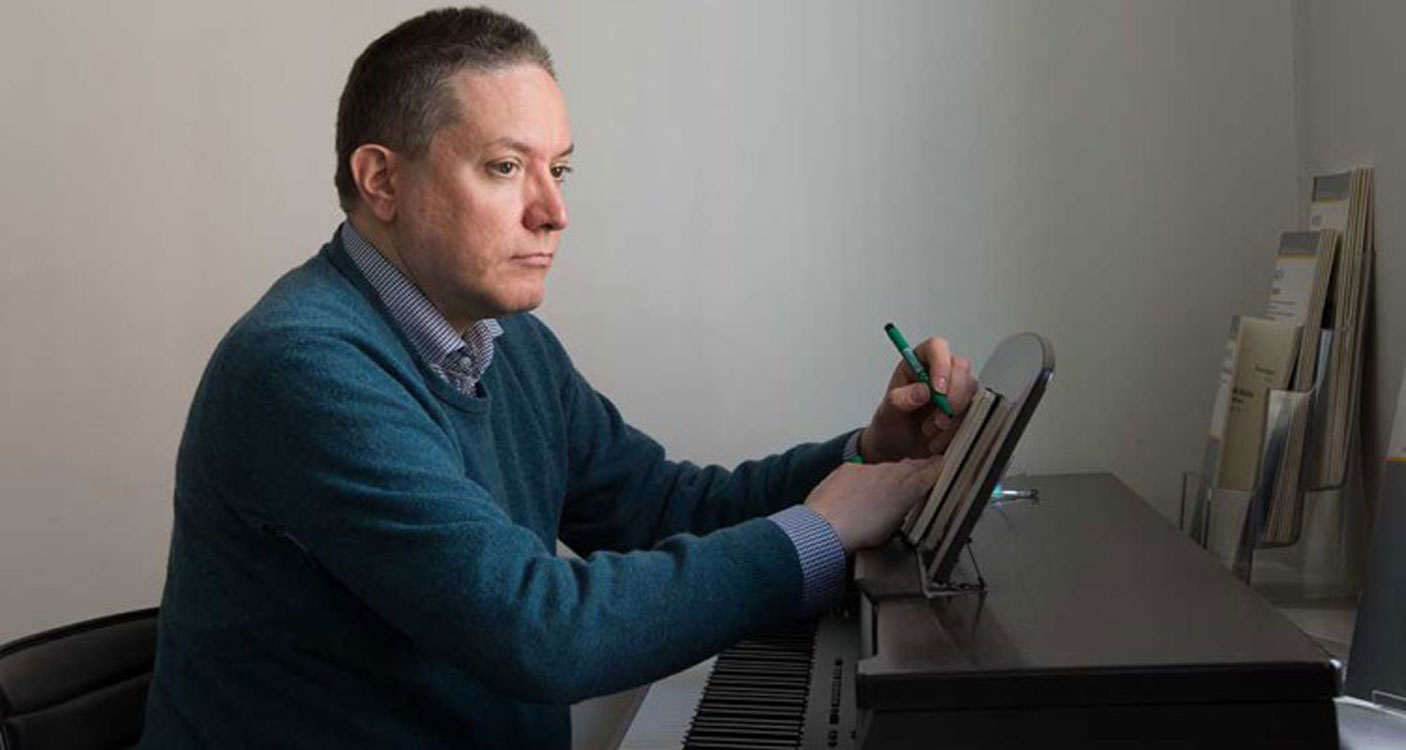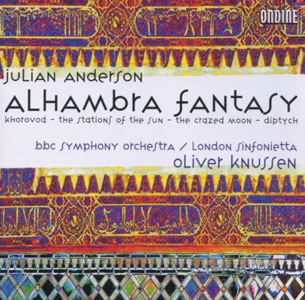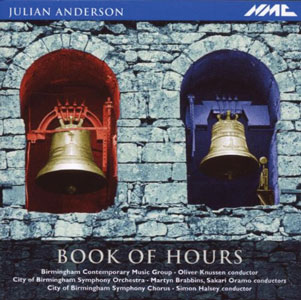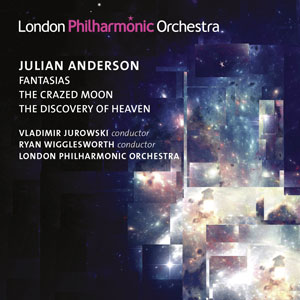Contemporary composer: Julian Anderson
Peter Quantrill
Friday, March 31, 2017
Peter Quantrill pays tribute to the Award-winning composer whose music ‘has a sure sense of its place in the world’

With a rustle, a scale or a fanfare, Julian Anderson’s music gives birth to itself anew each time. Khorovod (1989-94) opens with a riot, a tangle of voices shouting the same song without words but each according to its character, in its own time. This is pure heterophony (the simultaneous variation of a single melody), and having found it in Gaelic and Ethiopian rites of sacred singing, Anderson found for himself a way of making distinctively new music that refreshes the polyphony exhausted by post-Serialist music, in which tangle may quickly become composed chaos to the ear. Khorovod can be called an Opus 1, even though Anderson had been writing music for 15 years by then, because he intended it to some extent as a breakthrough piece, and so it was taken.
Recollecting the reception of his music at the BBC Proms, from surprised enthusiasm at the end of Khorovod, a frisson of amused appreciation when the antiphonal horn calls of Imagin’d Corners (2002) coalesce for a second into the Nibelung motif, to the communal hush of active silence before Harmony (2013) and unembarrassed cheers at the end of Fantasias (2007–9), I hear public music with a sure sense of its place in the world. Anderson has said that he doesn’t write with a specific audience in mind, and the importance of melody in his music can’t satisfy a coterie of avant-gardists, any more than seekers of background solace to their own thoughts will find what they are looking for.
A khorovod is a communal rite of dancing with its roots in ancient Russian folk life, and we are invited to join in as listeners. The form of a khorovod evolved through centuries of participation rather than being established by doctrine, and it’s a useful metaphor for the non-hierarchical inner structures of his music, as well as the paradox between control and freedom, made manifest through tension and release, that Anderson confronts and resolves like a true composer. The principles behind heterophony and other vernacular styles encourage listeners to make their own choices. Does the clubland thrash at the heart of Khorovod bring celebratory or unconfined frenzy? Does the coda bear the meaning of emptiness or catharsis? It’s up to you. At the end of a piece, Anderson tends to hint at a path not taken, or one yet to come, with closures unmarked but made necessary by the journey in the middle. ‘I’m interested in seeing what you can do with an expressive intent by approaching it obliquely,’ he remarked to me. ‘Behind my pieces is very strong expressive intent, but if I literally splurge that out on to the paper I don’t find the results as interesting as if I dialogue with it, cajole it.’
The same technique of heterophony lends breadth and magnificence to certain passages of The Stations of the Sun (1998), Alhambra Fantasy (2000) and a Symphony (2004), which Anderson built as single, sustained narratives that reach a pitch of intensity where they have said all they could. Ancient traditions of nature observance also mark The Stations of the Sun, but Anderson’s music is anything but primitive; as Jonathan Nott said when preparing to conduct the premiere of Fantasias, ‘You look at it on the page, and you know immediately that every member of the orchestra has something interesting to do.’
In response to the quickening beat of commissions, Anderson has switched between writing for ensembles and orchestras, but smaller forces permit greater textural density. Scored for the 16 players of the London Sinfonietta, Alhambra Fantasy opens with perhaps his most violent music to date – the sweat and hammers building the Moorish palace, if you will – but when the energy explodes as eventually it must, what happens next is unexpected and glorious: no blasted tundra but a slow sound-sunrise, capped by a trumpet melody (Anderson likes these) and inflected by the Baroque magnificence of the finished palace, intricated further by the subtext of an act of memory. The piece is dedicated to the late Gérard Grisey, the French spectral composer and a friend whose investigations into the territory between and behind the 12 conventional notes of an octave made a deep impression on the young Anderson.
An enquiring mind and a command of languages supplied other influences beyond Anglophone quarters, among them the music of Claude Vivier, Luigi Dallapiccola and Ştefan Niculescu, though his roots lie in Pérotin, Dufay, Gesualdo and the Bach chorales that he would memorise each week for his first composition teacher at school. Having composed since childhood, he credits the local council’s music library in north London with exposure to five centuries of art music, from Ockeghem to Lutosawski, less for shaping taste and more for offering ideas. After studies with John Lambert, Oliver Knussen, an earlier Lambert pupil, became both inspiring mentor and vital champion.
Anderson recently opened the bottom drawer and took out a string quartet, written when he was 17 and premiered at last year’s Aldeburgh Festival by the Arditti Quartet. Light Music already moves away from the process journeys of spectral music, into a world of ‘glinting timbres, filtering sound like light through a prism’ (Richard Fairman in the Financial Times) that Anderson has made his own ever since. The title’s double meaning encloses a weightless discourse of sharp contrasts that plays untempered pitches against their better-behaved near-relatives. So do the four spatially separated horns at the start of Imagin’d Corners, slipping between the cracks of diatonic harmony, opening up a wondrous sense of expanded space and time, and reaching out to the titled corners of Milton’s round world. Out of scale to its brevity, Eden (2005) uses the clash of mean and tempered tunings to make a prelapsarian world of rude, unsettling beauty. The Armenian film-director Sergei Parajanov said of his own aesthetic that it explores ‘the inner dynamic that comes from inside the picture, the forms and the dramaturgy of colour’; a neat encapsulation of Anderson’s music. In 1994 he named a short chamber piece after Parajanov’s The Colour of Pomegranates, a film remarkable for the delicacy of its frame around a portrait of timeless folk tableaux, unsentimental, non-judgemental, celebrating life.
On a wider level, he shares with Janáček, Tippett and Stockhausen an ambition to write music without irony and an embrace of big subjects: who we are, what we seek. In Heaven is Shy of Earth (2006), the text of the Christian Mass is answered by settings of Emily Dickinson that question certainties, surrender themselves to natural forces and (like his music) test deep waters with simple craft: the flugelhorn tune at the outset comes from a wedding fanfare for friends. Book of Hours (2004) shows with electric energy that there are still half-hour pieces to be written around an ascending scale.
For the last three years he has gone beyond these old texts back to ancient Thebes, to write his first opera with a libretto adapted from Sophocles by Frank McGuinness. Setting the ghastly tale of Oedipus, and the redeeming virtue of his daughter Antigone, has been a long but natural process. ‘As soon as I’m thinking of a character or moment in the plot, I’m thinking about what musical technique will best suit that, and I’m marrying the technique to the expression. It’s not straightforward. I try to vary the relationship between the orchestra and what’s on stage – the main polarity of this opera – between co-operation and contradiction, and at some points even ignoring each other.’ Anderson can talk with passion and sometimes despair about tragedies of past and present but his music forms acts of rebellion against that despair. There is the via negativa of rejecting the past, and another of denying it took place. He invites us on a different, more positive path.
Recommended recordings

Alhambra Fantasy. Khorovod. The Stations of the Sun. The Crazed Moon. Diptych
London Sinfonietta, BBCSO / Knussen
(Ondine)
A 2007 Gramophone Award for this disc was belated recognition of Anderson’s significance as a composer, teacher, writer and dynamic presence in British new music.

Book of Hours. Imagin’d Corners. Eden. Symphony. American Choruses
CBSO Chorus; CBSO / Brabbins, Oramo; BCMG / Knussen
(NMC)
The work of Anderson’s period as composer in association with the CBSO, 2001–5.

The Discovery of Heaven. Fantasias. The Crazed Moon
LPO / Jurowski, Wigglesworth
(LPO)
The Discovery of Heaven is a multi-movement work whose finale is an attempt to reconcile gagaku-tinted calm and wild street sounds, ‘but it is built to fail,’ says the composer. ‘Under the tension of trying to find reconciliation is a big fight – I like dialectic.’
Anderson Facts
Born
1967, London
Career
Professor of Composition at the Guildhall School of Music and Drama, London, having held similar posts at Harvard and the Royal Academy of Music
Residences
Composer in residence for Wigmore Hall and the London Philharmonic Orchestra











